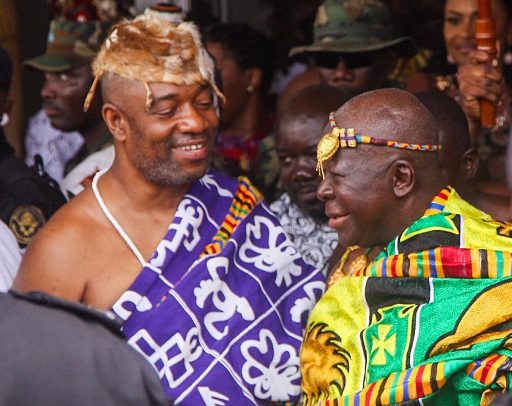Two great chiefs in our country last Sunday made history.
The re-enactment of the royal engagement between the Ga State and the Asante Kingdom, almost 78 years ago, attracted religious leaders, politicians, corporate leaders and a cross section of the people.
It also brought other activities in the Ga Mantse’s Palace in North Kaneshie in Accra to a standstill.
The durbar, characterised by the rich culture of the two kingdoms, according to the celebrants, was to deepen the bond of friendship between Gas and Asantes.
Sunday’s event is significant for many reasons, key among them being the attempt to erase the erroneous impression that there exists stereotypes between the two ethnic groups.
In spite of some deliberate policies by governments to ensure unity in diversity, some of our compatriots still hold on to the belief that one ethnic group is superior than the other.
Unfortunately, they forget that to build a modern nation state, all the ethnic groups forming the state called Ghana must collaborate to achieve inclusive development.
The boarding system in our schools, especially secondary schools helped to bring people from different ethnic and creed under one roof to learn, one of the critical reasons for unity, peace and stability in Ghana.
We commend the Asantehene, Otumfuo Osei Tutu II, and the Ga Mantse, King Tackie Teiko Tsuru II, for their initiative that reflected diversity in unity of the Ghanaian society.
Our traditional leaders have time and again bemoaned the attempt by the political ruling class to downplay their role in national mobilisation.
We are aware of the various traditional groupings from the regional houses of chiefs to the national house of chiefs but their participation can just be described as token, because those bodies are part of the official bureaucracy in the country.
We also know about the wisdom of the sages that, “united we stand, divided we fall” and other words “in unity lies strength.”
It is against this backdrop that we urge the Asantehene and the Ga Mantse not to make last Sunday’s “togetherness” a nine day wonder but a regular feature of their friendship.
More importantly, we urge the Asantehene and the Ga Mantse not to limit their new found ‘love’ to the Asante and the Ga kingdoms but to all traditional areas in the country.
Once upon a time our chiefs, especially the overlords were a very strong voice in our public space. However, for some unexplained reasons, these once strong and sane voices relinquished their roles to very partisan and parochial politicians to destroy our fabric and heritage.
We appeal to our chiefs, particularly the Ga Mantse and the Asantehene as well as other well meaning ones, never again to exhibit loud silence over the actions and inactions of our politicians. When they speak with one voice, the politicians are bound to listen.
After all, the chiefs are the custodians of the land, a major factor of production and the people from East to West and South to North hold our chiefs in high esteem and for which reason they respect their chiefs.
The chiefs must leverage their authority to change the negative practices of our people such as the increasing damage being caused by ‘Galamsey’ and environmental degradation.
King Tackie Teiko Tsuru in his address called on the people to pursue a common destiny by shunning tendencies that could foster division.
The Asantehene on his part recounted the relationship between Asantes and Gas which represented true friendship saying that his visit was to make it stronger.
The Greater Accra Regional Minister, Daniel Nii Titus Glover, summed the aspirations of today’s Ghanaian people when he said, “Chieftaincy is not about wars to conquer territories. It is about friendship; it is about collaboration, and how we can develop our people.”
The two great Kings have started the new pathways for collaboration among chiefs beyond the pomp and ceremony to bringing the people together as one with a common and great destiny.
Working in silos will not help to impact on the wellbeing of their people. The Accra engagement between the two Kings offers food for thought for a paradigm shift from stereotyping people from different ethnic groups.


